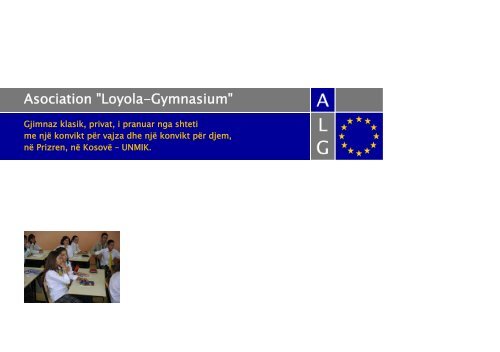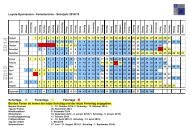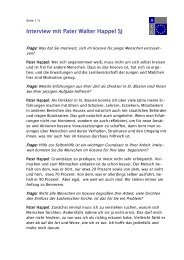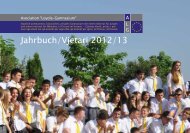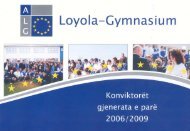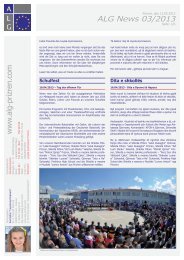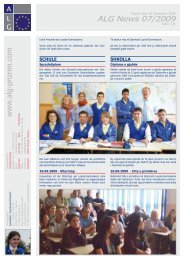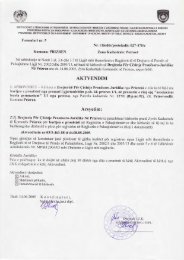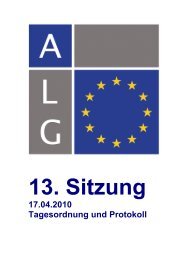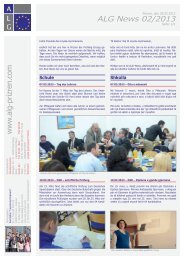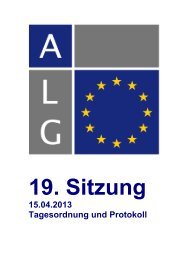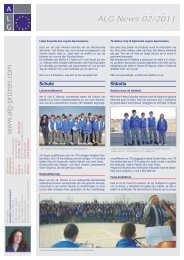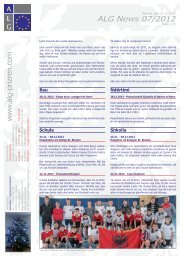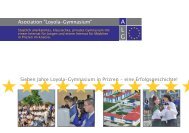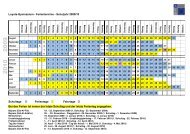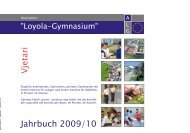Asociation Loyola Gymnasium - Prizren
Asociation Loyola Gymnasium - Prizren
Asociation Loyola Gymnasium - Prizren
Sie wollen auch ein ePaper? Erhöhen Sie die Reichweite Ihrer Titel.
YUMPU macht aus Druck-PDFs automatisch weboptimierte ePaper, die Google liebt.
<strong>Asociation</strong> "<strong>Loyola</strong>-<strong>Gymnasium</strong>"<br />
Gjimnaz klasik, privat, i pranuar nga shteti<br />
me një konvikt për vajza dhe një konvikt për djem,<br />
në <strong>Prizren</strong>, në Kosovë – UNMIK.
Internet<br />
www.alg-prizren.com<br />
2
Impressum<br />
<strong>Asociation</strong> "<strong>Loyola</strong>-<strong>Gymnasium</strong>"<br />
Rr. e Tranzitit Petrovë<br />
20000 <strong>Prizren</strong><br />
Kosovë -UNMIK<br />
v.i.S.d.P.<br />
P. Walter Happel SJ<br />
Copyright © 2006 <strong>Asociation</strong> "<strong>Loyola</strong>-<strong>Gymnasium</strong>"<br />
3
Përmbajtja<br />
Ideja ............................................................................................................................................................................................. 5<br />
Projekti ......................................................................................................................................................................................... 6<br />
Shoqëria bartëse ........................................................................................................................................................................... 10<br />
Shkolla & Konviktet ....................................................................................................................................................................... 12<br />
Pedagogët & Edukatorët ................................................................................................................................................................ 16<br />
Udhëheqja .................................................................................................................................................................................... 17<br />
Koncepti pedagogjik .................................................................................................................................................................... 18<br />
Miqtë, përkrahësit dhe partnerët ................................................................................................................................................... 22<br />
Kontakti ........................................................................................................................................................................................ 24<br />
4
Ideja<br />
Fëmijëve u nevojitet e ardhmja<br />
Shpresat më të mëdha për Kosovën janë të drejtuara kah rinia e vendit. Më tepër se gjysma e popullsisë është më e re se 25 vjeçare, njëra<br />
nga popullsitë më të reja të Evropës. E tërë kjo është e mbështetur në faktin që kjo gjeneratë të mos rritet edhe më tej në një atmosferë të<br />
pa perspektivë, e kufizuar, e ndarë dhe me urrejtje. Kjo rini ka nevojë për një shans për zgjerim të mirëkuptimit, të kujdesit dhe respektit.<br />
Ajo ka nevojë për arsimim në kuptimin evropian.<br />
Të rinjtë dhe të rejat e të gjitha etnive dhe përkatësive fetare duhet të shkojnë bashkërisht në shkollë dhe të mësohen të jetojnë përsëri me<br />
njëri tjetrin.<br />
Për Konventën e KB mbi të drejtat e fëmijës të vitit 1989 kërkesa qendrore është që të gjithë fëmijët të kenë të drejtë në shkollim të mirë<br />
fillor dhe të kenë qasje të barabartë në shkollimin sekondar (e mesëm), sepse edukimi dhe arsimimi janë bazament për zhvillim dhe çelës i<br />
së ardhmes.<br />
Zhan Monet (Jean Monnet 1888 - 1979), një ideator nismëtar dhe modelues i Evropës së bashkuar pat thënë me një rast: "Në qoftë se do të<br />
më duhej edhe njëherë të filloja nga e para, shumë më tepër do të investoja në kulturë dhe arsim se sa në ekonomi“. Kosova si shtet<br />
demokratik evropian në botën islame ka të drejtë të pret angazhim të veçantë të Evropës.<br />
Bash për këtë shkak në vjeshtën e vitit 2002 prindërit kosovarë iu drejtuan njërit prej bashkëpunëtorëve të Renovabis-it Aksioni i<br />
solidaritetit të katolikëve gjermanë me njerëzit e Evropës Lindore, dhe e lutën të hapë një gjimnaz klasik në Kosovë.<br />
5
Projekti<br />
Themelimi i gjimnazit klasik me<br />
një konvikt për vajza dhe një konvikt për djem<br />
Renovabis-i që në pranverën e vitit 2003 e ka dërguar P. Happel SJ në Kosovë dhe e ka ngarkuar me<br />
përgatitjen e një studimi të realizueshmërisë me pyetjen: A ka mundësi për ngritjen e një gjimnazi<br />
klasik në Kosovë. Në fund të qershorit 2003 u prezantuan rezultatet. Themelimi i një gjimnazi klasik<br />
në Kosovë nuk është vetëm i dëshiruar dhe i mundshëm por edhe përgjegjësi e plotë. Kujdes i veçantë<br />
duhet t`i kushtohet edukimit të vajzave dhe atyre t’u epet shansi për një arsimim të mirë. Gjimnazi, që<br />
do të themelohet, duhet patjetër të jetë gjimnaz me konvikt i cili do të jetë i hapur për të gjithë<br />
kosovarët dhe vendet për rreth.<br />
Nga ideja bëhet projekti<br />
Në vjeshtë 2003 Renovabis-i ngarkoi Krahinën gjermane të Jezuitëve me realizimin e projektit dhe<br />
njëkohësisht i premtoi një financim shtytës të begatë si dhe marrjen përsipër të një pjese të madhe të<br />
shpenzimeve të ndërtimit. Përsëri me këtë ngarkohet P. Walter Happel SJ dhe dërgohet në Kosovë.<br />
<strong>Prizren</strong>i si vend i ngjarjes<br />
<strong>Prizren</strong>i është kryeqyteti historik i Kosovës. Shumë shpesh diskutohet mundësia e dislokimit të<br />
funksionit të kryeqytetit nga Prishtinë në <strong>Prizren</strong>. Përveç kësaj <strong>Prizren</strong>i në esencë është një qytet i<br />
zhvilluar në të cilin gjimnazi klasik ka një vlerë të lartë simbolike dhe i cili përforcon edhe më tutje<br />
6
Projekti<br />
domethënien e komunës. <strong>Prizren</strong>i gjendet në „Sektorin gjerman“ të KFOR-it, dhe nga pikëpamja kriminalistike është qyteti më i sigurt në<br />
Kosovë. Bundesveri (Ushtria federale gjermane) dhe gjermanët këtu gëzojnë një reputacion shumë të mirë. Në <strong>Prizren</strong> mund të arrihet<br />
shumë shpejtë nga Maqedonia dhe Shqipëria. Në këtë mënyrë gjimnazi është i hapur edhe për qytetarët e Maqedonisë dhe të Shqipërisë.<br />
Inkorporimi në strukturat vendore<br />
P. Happel SJ fillon punën e tij në <strong>Prizren</strong> së pari duke realizuar kontakte me të gjitha organizatat e rëndësishme. Ai zhvillon bisedime me<br />
përfaqësuesit e autoriteteve vendore, të UNMIK-ut, KFOR-it dhe të CIMIC, këshillohet me AKM dhe OJQ-të aktive në Kosovë. Ai negocion me<br />
administratën e qytetit të <strong>Prizren</strong>it dhe Ministritë kompetente në Prishtinë. Jo të fundit ai projektin ia prezanton edhe Administraturës<br />
apostolike në <strong>Prizren</strong>.<br />
Ai nga të gjitha anët mëson jo vetëm për dashamirësi, por edhe gatishmërinë për ndihmën konkrete të partnerëve të tij në biseda sipas<br />
mundësive në rrethanat ekzistuese. Hap pas hapi tejkalohen pengesat formale dhe burokratike dhe te organizatat pjesëmarrëse krijohet<br />
ndjenja e projektit “të përbashkët”.<br />
Për mbështetjen që tanimë dihet si dhe për atë që në të ardhmen sigurisht do të nevojitet shpesh nga ky vend u falenderohemi<br />
përzemërsisht të gjithë pjesëmarrësve!<br />
7
Projekti<br />
Si person juridik, veprues në Kosovë në dhjetor 2003 është formuar Asociacioni “Gjimnazi <strong>Loyola</strong>” (Akronimi: ALG), si Shoqëri bartëse për<br />
gjimnazin dhe konviktet dhe ai është regjistruar si OJQ dhe është lajmëruar te UNMIK-u në Prishtinë.<br />
Parcela e ndërtimit<br />
Parcela e ndërtimit që është dhënë në dispozicion nga qyteti i <strong>Prizren</strong>it ka një sipërfaqe prej afro 3,8 ha dhe shtrihet në periferinë<br />
veriperëndimore të <strong>Prizren</strong>it, drejtpërsëdrejti në rrugën transite në drejtim të Shqipërisë. Me certifikatën e datës 11 maj 2005 UNMIK- u e ka<br />
bërë regjistrimit e truallit për 99 vjet. Regjistrimi në librat e kadastrave është kryer më 15 qershor 2005.<br />
Tenderi<br />
Në janar 2005 është publikuar shpallja për planin e ndërtimit. Në afatin e dhënë, nga të interesuarit u morën<br />
11 komplete të dokumentacionit të tenderit. Deri në ditën e mbylljes ishin paraqitur 4 oferta. Një komision<br />
përzgjedhës i përbërë prej pesë anëtarësh bëri shqyrtimin e ofertave. Si fitues u shpall firma Global.<br />
Dhënia e porosisë dhe fillimi i ndërtimit<br />
Më 24 mars 2005 është nënshkruar kontrata për ndërtim me firmën Global dhe më 16 prill 2005 pason vënia<br />
solemne e gurit themeltar.<br />
8
Projekti<br />
Përurimi<br />
Vetëm 5 muaj më vonë, më 12 shtarot 2005 u bë<br />
përurimi i një pjese të shkollës dhe konvikteve.<br />
Mësimi filloi me 184 fëmijë në ditën e nesërme.<br />
Kjo ka qenë e mundur vetëm përmes ndërtimit të<br />
pandërprë dhe shfrytëzimit të plotë të angazhimit<br />
të të gjithë pjesëmarrësve. Kohë pas kohe në<br />
kantier kishte të punësuar mbi 200 punëtorë.<br />
Organizata Deutsches Technisches Hilfswerk<br />
bënte mbikëqyrjen e punimeve. Renovabisi ka<br />
bartur pjesën kryesore të shpenzimeve për pjesën<br />
e parë të ndërtimit.<br />
9
Shoqëria bartëse<br />
Bartësi përgjegjës juridik<br />
Projekti pa person juridik në Kosovë ishte dhe është i pamundur. Personi juridik shërben si partner bashkëbisedues për të gjitha organizatat<br />
kombëtare dhe ndërkombëtare dhe funksionon si bartës për Gjimnazin dhe për konviktet. Me emrin <strong>Asociation</strong> "<strong>Loyola</strong>-<strong>Gymnasium</strong>" është<br />
formuar në Prishtinë si shoqëri bartëse në dhjetor të vitit 2003 dhe qysh më 19 janar 2004 është regjistruar te UNMIK-u si Organizatë<br />
joqeveritare (OJQ). Më 8 shkurt 2005 Shoqërisë bartëse nga Ministria për Punë Publike i është pranuar Public Benefit Status (Statusi i<br />
interesit të përgjithshëm).<br />
Qëllimi i Shoqërisë është nxitja e shkollimit dhe arsimimit klasik në Kosovë dhe në këtë mënyrë përkrahja e njerëzve të rinj. Këtu përfshihet<br />
përgatitja e rinisë kosovare për konkurrencë në Evropë dhe integrimi i tyre përkatës në sferën e arsimit dhe shkencës si dhe zhvillimit dhe<br />
përvetësimit të njohurive nga kultura, shkenca dhe arti, të cilat i përgjigjen moshës.<br />
Seanca konstituive e Shoqërisë bartëse<br />
Më 18 maj 2004 në sallën e vogël të mbledhjeve të Kuvendit në <strong>Prizren</strong> është mbajtur seanca konstituive e Shoqërisë bartëse. Për hapat e<br />
parë në procesverbal është shënuar:<br />
"Anëtarët ishin unik që qysh në këtë vit duhet të fillohet me zbatimin e projektit. Pastaj, për shkaqe kohe (përfundimi i shpejtë i vitit<br />
shkollor, zgjedhja e pedagogëve, mësimi fillestar dhe kualifikimi, dhomat provizore të mësimit), fillimi i mësimit tanimë nuk kishte mundësi<br />
të realizohet në vitin e ardhshëm shkollor (shtator 2004), andaj anëtarët kanë vendosur të ndërmarrin gjithçka ashtu që në vitin shkollor<br />
(2004/05) të krijohen mundësitë për të filluar ndërtimin. Po ashtu do të duhej që sa më parë që është e mundur të bëhet zgjedhja dhe<br />
10
Shoqëria bartëse<br />
trajnimi i pedagogëve dhe të përpunohet programi pedagogjik ... ." Në këtë<br />
mënyrë është përcaktuar drejtimi për fillimin e ndërtimit dhe qysh në shtator<br />
2005 shkolla dhe internati filluan nga puna.<br />
Anëtarët aktualë të Shoqërisë bartëse<br />
• Krahina Kroate e Jezuitëve<br />
• Krahina Gjermane e Jezuitëve<br />
• Françeskanet nga Cetinja<br />
• Administratura Apostolike <strong>Prizren</strong><br />
• Albanian Youth Action<br />
• Kosova Alternative Education<br />
• Fondacioni Marianne dhe Rudolf Haver (Marianne und Rudolf Haver<br />
Stiftung)<br />
• Stellaner-Vereinigung Deutschland e.V.<br />
• Helmetat e gjelbra Sh. r. (Grünhelme e.V.)<br />
Të dëshiruar janë gjithsesi edhe anëtarët tjerë.<br />
11
Shkolla dhe konviktet<br />
Ne duam të bëjmë diç për ardhmërinë e fëmijëve të Kosovës.<br />
Shkolla jonë<br />
Gjimnazi <strong>Loyola</strong> në <strong>Prizren</strong> është gjimnaz privat, klasik i pranuar nga shteti,<br />
me një konvikt për vajza dhe një konvikt për djem, i cili nga ALG përgjigjet si organizatë me interes<br />
të përgjithshëm.<br />
Veçoritë<br />
Ne duam të bëjmë diç për fëmijët e Kosovës, d.m.th. ti përmirësojmë shanset për një Evropë e cila<br />
çdo ditë e më tepër po bashkohet. Për këtë arsye, sipas mendimit tonë, shkollimi nuk duhet kuptuar<br />
vetëm si dhënie e mësimit por si premisë qenësore.<br />
Shkallët e zakonshme sekondare në Kosovë I dhe II ne i kemi përfshirë së bashku në gjimnazin<br />
klasik. Tanimë nxënësit tanë vijnë te ne që nga klasa e gjashtë. Vetëm për një kohë kalimtare prej 2<br />
vitesh, në vitet shkollore 2006/07 dhe 2007/08 planifikojmë pranimin e nxënësve edhe në klasën e<br />
dhjetë. Pas 4 vitesh në shkallën e parë sekondare dhe në 3 ose 4 vitet tjera në shkallën e dytë<br />
sekondare (shkollimit të mesëm) me përfundimin e shkollës fitohet matura.<br />
Për të pasur mundësi që fëmijët, të cilët nuk banojnë në rrethinën e shkollës, mund ta shfrytëzojnë<br />
12
Shkolla dhe konviktet<br />
ofertën tonë, ne disponojmë me konvikt për vajza dhe një për djem. Përkrahja e vajzave për ne është një qëllim i veçantë. Për këtë arsye<br />
gjysma e tërë vendeve në shkollë dhe në konvikte janë të rezervuara për vajza.<br />
Natyrisht se plani i rregullt mësimor i Kosovës vlen edhe për ne. Por, ne atë e kemi plotësuar në disa pika. Një ndryshim thelbësor është<br />
radhitja e gjuhëve. Qe nga klasa e gjashtë (6) ligjërojmë dy gjuhë të huaja: gjermanishten dhe latinishten. Nga klasa e tetë (8) kësaj i<br />
shtohet edhe gjuha angleze. Për nxënësit që vijnë te ne me njohuri paraprake të gjuhës angleze, ne atyre në klasën e 6 dhe 7 ju ofrojmë<br />
kurse, që t’i ruajnë këto njohuri. Në gjuhën gjermane nxënësit tanë mund të fitojnë diplomën e gjuhës gjermane, njërin nga parakushtet më<br />
të rëndësishme për të studiuar jashtë, në vendet ku flitet gjuha gjermane. Nga latinishtja duhet të arrihet niveli i cili së paku i përgjigjet<br />
“Latinumit të vogël”.<br />
Kualifikimi i mëtutjeshëm i rregullt, seminaret dhe hospitimet në vazhdimësi plotësojnë kompetencën pedagogjike dhe profesionale të<br />
pedagogëve tanë.<br />
Shkolla jonë duhet të shquhet si bashkësi e atyre që japin dhe atyre që marrin mësim, bashkësi e nxënësve, e pedagogëve dhe prindërve.<br />
Këtu përfshihen edhe mekanizmat e zëdhënësve të klasave, bashkëpërgjegjësve të nxënësve, konferencave të klasave dhe konferencave të<br />
përgjithshme, kuvendeve të prindërve, këshillat e prindërve si dhe aktivitetet jashtë planit mësimor si festat shkollore, ditët e dyerve të<br />
hapura dhe të ngjashme. Në mensat tona ju ofrojmë edhe nxënësve të jashtëm si dhe pedagogëve dhe të zënëve me punë, një drekë, për<br />
një shumë e cila mbulon shpenzimet.<br />
13
Shkolla dhe konviktet<br />
Veçoritë në pikat e caktuara<br />
• Radhitja e gjuhëve: gjermanisht, latinisht, anglisht<br />
• Pedagogjia ignaciononale<br />
• Konviktet<br />
• Kualifikimet e pa ndërprera të pedagogëve në shkollat partnere në Evropën Perëndimore<br />
• Bashkësi e të mësuarve - pedagogëve, nxënësve dhe prindërve<br />
• Zëdhënësit e klasave dhe bashkëpërgjegjësve të nxënësve - BPN<br />
• Këshilli i prindërve/Kuvendi i prindërve<br />
• Aktivitetet jashtë planit mësimor si festat e shkollës, ditët e dyerve të hapura dhe të ngjashme<br />
• Rregullimi special i pushimeve shkollore sipas nevojave pedagogjike<br />
• Konferencat e pedagogëve, të klasave dhe ato të përgjithshme<br />
• Pedagogët e mirëbesimit<br />
• Rendi shkollor<br />
• Dreka për mësues dhe bashkëpunëtorë të jashtëm dhe të brendshëm<br />
14
Shkolla dhe konviktet<br />
Konviktet tona<br />
Oferta jonë mësimore vlen për tërë Kosovën. Fëmijët nga tërë Kosova dhe nga<br />
vendet për rreth duhet të kenë mundësinë të vijojnë shkollën tonë. Në këtë<br />
rast vëmendja jonë e veçantë i është përkushtuar përkrahjes së vajzave.<br />
Në konvikte janë të vendosur fëmijët në dhoma me katër shtretër me dush<br />
dhe WC. Për të mirën trupore kujdeset ekipi jonë i kuzhinës. Udhëheqja e<br />
konvikteve i është besuar françeskaneve nga Cetinja, Mali i Zi, një urdhri të<br />
Krahinës së Shkollës për motra të Gracit. Motrat jetojnë në konvikt.<br />
15
Pedagogët dhe edukatorët<br />
Partnerë të prindërve, miq të nxënësve<br />
Pedagogët tanë<br />
Të gjithë pedagogët tanë janë zgjedhur në bisedimet prezantuese personale.<br />
Kritere qenësore për zgjedhje kanë qenë: përveç një suksesi të mirë gjatë shkollimit të lartë edhe kualifikimet e tyre njerëzore, pedagogjike<br />
dhe didaktike. Të gjithë pedagogët tanë flasin së paku një gjuhë të huaj.<br />
Kualifikimet e përhershme të pedagogëve tanë janë qëllimet tona qenësore. Ne, gjatë vitit shumë herë organizojmë seminare të<br />
përgjithshme nga pedagogjia, didaktika, por rregullisht realizojmë kualifikime edhe nga lëndët profesionale. Këto masa përcillen me<br />
hospitime të pedagogëve, të cilët ne për këtë i dërgojmë në Gjermani, Austri dhe në vende tjera evropiane.<br />
Kolegjiumi ynë gjithnjë në rritje është këtu për të vënë në jetë planin mësimor të Kosovës dhe parimet tona të edukatës: “... Burrat dhe gratë<br />
për të tjerët!... Harmonizimi i përhershëm i përvojës, refleksionit dhe veprimit në dinamikën e të mësuarit vetë dhe mësimit të të tjerëve...”.<br />
Edukatorët tanë<br />
Edukatorët tanë përkujdesën për fëmijët jashtë kohës së mësimit, edhe gjatë fundjavës shkollore. Përveç aktiviteteve zbavitëse, muzikore<br />
dhe sportive, këtu përfshihet edhe përkrahja gjatë “studimit” ditor. Bashkërendimi i ngushtë me pedagogët, edukatorët dhe prindërit, si dhe<br />
bisedat e përhershme me ta janë çështje që kuptohen vetvetiu.<br />
16
Udhëheqja<br />
Ideatorët dhe konstruktorët<br />
Udhëheqja<br />
P. Walter Happel SJ Pal Bala<br />
Punëdrejtues<br />
Çështjet juridike<br />
walter.happel@alg-prizren.com<br />
pal.bala@alg-prizren.com<br />
Prof. Wolfgang Stierle<br />
Udhëheqja e shkollës<br />
wolfgang.stierle@alg-prizren.com<br />
Jürgen Schwarzbach<br />
Financat<br />
juergen.schwarzbach@alg-prizren.com<br />
M. Hana Kqira<br />
Udhëheqja e konviktit<br />
hana.kqira@alg-prizren.com<br />
17
Koncepti pedagogjik<br />
Parimet themelore të edukatës në Gjimnazin - <strong>Loyola</strong><br />
Ne ndjekim një pedagogji optimiste. Edukimi ynë është pranues i botës dhe jetës dhe dëshiron t`i kontribuojë formimit të tërësishëm të<br />
individit në bashkësi, ky edukim synon ta ndihmojë dialogun.<br />
Për shkak të qëndrimit pozitiv ndaj botës pedagogjia jonë i përmbahet parimit se çdo gjë vlen të hulumtohet. Nxënësit parimisht duhet të<br />
jenë të hapur ndaj të gjitha pyetjeve dhe fushat e problemeve, por edhe të gatshëm për punë – jo vetëm paradite në shkollë. Vetëm dhënia<br />
e dijës dhe aftësive funksionale si të vetme nuk paraqesin ndonjë arsimim. Arsimimi nuk bëhet pa vlera. Për këtë arsye zhvillimi i personit<br />
individual shihet si një nga qëllimet më të rëndësishme të një arsimimi të mirë shkollor, si dhe një edukimi të përgjithshëm.<br />
• Ne vlerësojmë trajtimin dhe kujdesin individual për çdo nxënës.<br />
• Ne theksojmë nismën individuale dhe i përmbahemi asaj se duhet të mësohet gjatë tërë jetës.<br />
• Ne kemi për orientim vlerat dhe inkurajojmë për njohuri, për dashuri dhe për pranimin e vetvetes sonë.<br />
• Ne dëshirojmë të kontribuojmë për njohuri realiste të botës dhe krijimit të saj.<br />
• Ne kemi për pikësynim atë të jashtëzakonshmen për të zhvilluar prirjet e personalitetit në mënyrën sa më të mirë të mundshme.<br />
Mësimi për vlerat në Gjimnazin Loyla <strong>Prizren</strong> bëhet në njërën anë përmes përzgjedhjes së kujdesshme të edukatorëve dhe pedagogëve dhe<br />
shembullit, të cilin ata ua japin nxënësve në jetën e përditshme. Në anën tjetër përmes mësimdhënies në të gjitha lëmit profesionale për të<br />
cilat ata janë aftësuar.<br />
18
Koncepti pedagogjik<br />
Aspekte të rëndësishme të formimit të personalitetit<br />
kanë të bëjnë me aftësitë sociale, si aftësia për kritikë,<br />
ndjeshmëria dhe kreativiteti, por para së gjithash<br />
respekti ndaj të tjerëve dhe aftësia për përkushtim<br />
njerëzor.<br />
Këtu qëndron shansi i veçantë i shkollës me konvikt, siç<br />
është Gjimnazi <strong>Loyola</strong> në <strong>Prizren</strong>: gërshetimi i ngushtë i<br />
jetës dhe mësimit, i mësimdhënies dhe kohës së lirë<br />
mundëson një formim dhe arsimim të mirë. Këtu mund<br />
të mësohet dhe ushtrohet një sjellje sociale, që krijon<br />
arsimim shoqëror dhe të ndjenjës së përkatësisë së një<br />
bashkësie. Kështu ndodh me edukimin në grupet e<br />
konvikteve, i cili i përshtatet moshës dhe aspektit të<br />
pedagogjisë moderne. Ne jemi të bindur se pasuria e<br />
mendimit evropian paraqet një fondament të<br />
përshtatshëm për të arritur dijeni dhe arsimim.<br />
19
Koncepti pedagogjik<br />
Edhe pse jeta dhe të mësuarit në bashkësi kanë disa lehtësira, nuk ka arsimim pa mund. Shkolla jonë është një institucion arsimor e cila bën<br />
përgatitjet për të ardhmen dhe kërkon angazhim të dukshëm personal.<br />
Edukimi në Gjimnazin <strong>Loyola</strong> <strong>Prizren</strong> lidh atë që shumë herë është provuar me kërkesat e reja. Për këtë arsye edukimi në Gjimnazin <strong>Loyola</strong><br />
<strong>Prizren</strong> përfshinë mësimin e gjuhës latine, gjermane dhe angleze, sikurse edhe mësimin e shkencave moderne natyrore.<br />
Dituria e fituar dhe talenti nuk duhet ti shërbejnë vetëm kënaqjes egoiste të nevojave individuale, por duhet përherë të përdoren edhe për të<br />
mirën e shoqërisë. Për këtë arsye edukimi në Gjimnazin <strong>Loyola</strong> <strong>Prizren</strong> është i lidhur me shoqëroren. Ai kuptohet si një pjesë e idesë<br />
evropiane dhe duhet të zgjojë kërkesën për drejtësi sociale. Ky angazhim duhet të shpie kah shërbimi i shquar për të tjerët dhe aftësimi për<br />
marrjen e pozicioneve përgjegjëse në shoqëri.<br />
Njerëzit janë individë me dhunti dhe mundësi të ndryshme. Për këtë shkak ne nuk guxojmë të përdorim kritere të njëjta për secilin në<br />
kuptimin e punës konkurruese. Por secili nxënës i yni duhet të provojë të zhvillojë më së miri talentin dhe aftësitë e veta. Për këtë ne në<br />
mënyrë të barabartë kërkojmë ndërgjegjshmërinë, aftësinë dhe gatishmërinë për punë jo vetëm prej nxënësve tanë, por edhe nga prindërit<br />
e tyre dhe natyrisht nga vet ne.<br />
• Pedagogjia jonë ngritët mbi bashkëpunimin e përhershëm besimplotë të prindërve, pedagogëve, edukatorëve dhe nxënësve. Kjo<br />
kërkon:<br />
• Këmbim të shpeshtë të informatave dhe mendimeve.<br />
20
Koncepti pedagogjik<br />
• Gatishmëri për të mësuar nga ana e nxënësve, prindërve, pedagogëve dhe<br />
edukatorëve.<br />
• Bashkëpunim nga ekipi udhëheqës (punëdrejtuesi, drejtori i shkollës, drejtori i<br />
konviktit), Konferenca e pedagogëve dhe edukatorëve, përfaqësuesve të prindërve<br />
dhe nga nxënësit.<br />
• Përgjegjësi duhet të marrin të gjithë pjesëmarrësit në procesin edukativ, por edhe vet<br />
procesi duhet të rishqyrtohet rregullisht.<br />
Kështu Gjimnazi <strong>Loyola</strong> në <strong>Prizren</strong> nuk ka për qëllim të vetëm atë që nxënëset dhe<br />
nxënësit ta mbarojnë shkollën me sukses të mirë, por që ata të aftësohen si personalitet,<br />
të cilët të pajisur me tiparet e vlerave dhe qëllimeve evropiane “si njerëz për të tjerët”<br />
krijojnë jetë të ndërgjegjshme dhe me përgjegjësi në këtë botë dhe shoqëri.<br />
21
Miqtë, përkrahësit dhe partnerët<br />
Donatorët dhe shoqëruesit<br />
Pa Renovabisin, i cili në vitin 2003 porositi studimin e realizueshmërisë dhe, pastaj, së bashku më krahinën e Jezuitëve gjermanë vendosi që<br />
këtë projekt ta zbatojë në jetë, sot në <strong>Prizren</strong> nuk do të kishte kurrfarë gjimnazi të ri me konvikte. Edhe funksionimi i shkollës sonë dhe<br />
konvikteve pa Renovabisin, anëtarët e Shoqërisë bartëse dhe partnerët tanë nuk do të ishte i mundshëm.<br />
Në 2 vitet e fundit ne kemi gjetur shumë miq dhe përkrahës. Të gjithë atyre dëshirojmë tu falënderohemi përzemërsisht. Natyrisht që ne<br />
shpresojmë në ndihmën tuaj edhe më tutje, prej të cilës fëmijët e Kosovës me siguri do të jenë të varur edhe disa vite.<br />
Përveç shumë dhuruesve privat, të cilët as që mund të numërohen të gjithë, në vazhdim do të gjeni një zgjedhje të atyre, të cilët kanë dhënë<br />
një kontribut të rëndësishëm për suksesin e projektit tonë:<br />
• Renovabis, Aksioni i solidaritet të katolikëve gjermanë me njerëzit e Evropës Lindore,<br />
• Qyteti i <strong>Prizren</strong>it, Ministria e Arsimit, Shkencës dhe Teknologjisë, Prishtinë, dhe të tjerë,<br />
• Kindermissionswerk Aachen, Sternsinger,<br />
• Erdiözese Köln, Diözese Limburg etj.,<br />
• Gemeinnützige Hertie-Stiftung, Landesstiftung Baden-Württemberg etj., dhe<br />
• Italienische Bischofskonferenz, Comitato per gli interventi caritativi a favore del terzo mondo.<br />
22
Internet<br />
www.alg-prizren.com<br />
23
Kontakti<br />
Kontoja e donacioneve<br />
<strong>Asociation</strong> "<strong>Loyola</strong>-<strong>Gymnasium</strong>" Missionsprokur der Deutschen Jesuiten<br />
Rr. e Tranzitit Petrovë<br />
Ligabank Nürnberg<br />
20000 <strong>Prizren</strong> Konto: 511 55 82 BLZ: 750 903 00<br />
Kosovë UNMIK<br />
Fjalëkalimi: 8210, KOSOVO<br />
Punëdrejtues<br />
P. Walter Happel SJ<br />
walter.happel@alg-prizren.com<br />
Udhëheqja e shkollës<br />
Prof. Wolfgang Stierle<br />
wolfgang.stierle@alg-prizren.com<br />
Udhëheqja e konviktit<br />
Sr. Hana Kqira<br />
hana.kqira@alg-prizren.com<br />
www.alg-prizren.com<br />
24
<strong>Asociation</strong> "<strong>Loyola</strong>-<strong>Gymnasium</strong>"<br />
staatlich anerkanntes, klassisches, privates <strong>Gymnasium</strong>,<br />
mit einem Internat für Mädchen und einem Internat für Jungen,<br />
in <strong>Prizren</strong> im Kosovo - UNMIK
Impressum<br />
<strong>Asociation</strong> "<strong>Loyola</strong>-<strong>Gymnasium</strong>"<br />
Rr. e Tranzitit Petrovë<br />
20000 <strong>Prizren</strong><br />
Kosovo -UNMIK<br />
v.i.S.d.P.<br />
P. Walter Happel SJ<br />
Copyright © 2006 <strong>Asociation</strong> "<strong>Loyola</strong>-<strong>Gymnasium</strong>"<br />
www.alg-prizren.com<br />
2
Inhalt<br />
Idee .............................................................................................................................................................................................. 4<br />
Projekt ......................................................................................................................................................................................... 5<br />
Trägerverein ................................................................................................................................................................................. 9<br />
Schule & Internate ........................................................................................................................................................................ 11<br />
Lehrer & Erzieher .......................................................................................................................................................................... 15<br />
Leitung ......................................................................................................................................................................................... 16<br />
Pädagogisches Konzept ................................................................................................................................................................ 17<br />
Freunde, Förderer und Partner ...................................................................................................................................................... 21<br />
Gegenwart und Zukunft ................................................................................................................................................................ 22<br />
Kontakt ........................................................................................................................................................................................ 24<br />
3
Idee<br />
Kinder brauchen Zukunft<br />
Die größten Hoffnungen für das Kosovo richten sich auf die Jugend des Landes. Mehr als die Hälfte der Bevölkerung ist jünger als 25 Jahre,<br />
eine der jüngsten Bevölkerungen Europas. Es kommt alles darauf an, dass diese Generation nicht länger in einer Atmosphäre von<br />
Perspektivlosigkeit, Abgrenzung, Trennung und Hass heranwächst. Diese Jugend braucht eine Chance zur Entfaltung im Geist der<br />
Verständigung, der Achtung und des Respekts. Sie braucht die Möglichkeit zur Bildung im europäischen Sinne. Mädchen und Jungen aller<br />
Ethnien und Glaubensrichtungen sollen gemeinsam zur Schule gehen und wieder neu lernen miteinander zu leben.<br />
Zentral in der UN Konvention über die Rechte des Kindes von 1989 ist die Forderung, dass alle Kinder das Recht auf eine gute<br />
Grundschulbildung (primary education) und gleichberechtigten Zugang zur weiterführenden Bildung (secondary education) haben sollen,<br />
denn Erziehung und Bildung sind, als Grundlage für Entwicklung, der Schlüssel zur Zukunft.<br />
Jean Monnet (1888 - 1979), ein bedeutender Vordenker und Gestalter des vereinigten Europa sagte einmal: "Wenn ich nochmals zu<br />
beginnen hätte, würde ich beim Aufbau Europas weniger auf die Wirtschaft als vielmehr auf die Kultur und Bildung setzen." Das Kosovo als<br />
demokratisches europäisches Land in der islamischen Welt darf von Europa besonderes Engagement erwarten.<br />
Wohl auch deshalb wandten sich, im Herbst 2002, kosovarische Eltern an einen Mitarbeiter von Renovabis, Solidaritätsaktion der deutschen<br />
Katholiken mit den Menschen in Osteuropa, und baten zu helfen, ein klassisches <strong>Gymnasium</strong> im Kosovo zu errichten.<br />
4
Projekt<br />
Gründung eines klassischen <strong>Gymnasium</strong>s mit einem Internat für Mädchen und<br />
einem Internat für Jungen<br />
Renovabis entsandte noch im Frühjahr 2003 P. Happel SJ in das Kosovo und beauftragte ihn mit einer<br />
Machbarkeitsstudie zur Frage: Möglichkeit der Errichtung eines klassischen <strong>Gymnasium</strong>s im Kosovo.<br />
Ende Juni 2003 lagen die Ergebnisse vor. Die Gründung eines klassischen <strong>Gymnasium</strong>s im Kosovo ist<br />
nicht nur wünschenswert und machbar, sondern auch verantwortbar. Insbesondere muss man sich der<br />
Erziehung der Mädchen widmen und ihnen die Chance zu einer guten Ausbildung eröffnen. Das zu<br />
gründende <strong>Gymnasium</strong> sollte unbedingt ein Internatsgymnasium sein, das allen Kosovaren und den<br />
Anrainerstaaten offen steht.<br />
Aus der Idee wird ein Projekt<br />
Im Herbst 2003 beauftragt Renovabis die Deutsche Provinz der Jesuiten mit der Durchführung des<br />
Projekts und sagt gleichzeitig eine großzügige Anschubfinanzierung sowie die Übernahme eines<br />
großen Anteils der Baukosten zu. Wieder wird P. Walter Happel SJ damit beauftragt und in das Kosovo<br />
entsandt.<br />
<strong>Prizren</strong> als Standort<br />
<strong>Prizren</strong> ist die historische Hauptstadt des Kosovo. Immer wieder wird eine mögliche Verlegung der<br />
Hauptstadtfunktion von Prishtina nach <strong>Prizren</strong> diskutiert. Zudem ist <strong>Prizren</strong> im Kern eine gewachsene<br />
5
Projekt<br />
Stadt, in der ein klassisches <strong>Gymnasium</strong> einen hohen Symbolwert hat und die Bedeutung der Kommune weiter stärkt. <strong>Prizren</strong> liegt im<br />
"deutschen Sektor" der KFOR und ist kriminalstatistisch die sicherste Stadt des Kosovo. Die Bundeswehr und die Deutschen genießen hier<br />
einen sehr guten Ruf. <strong>Prizren</strong> ist von Makedonien und Albanien schnell erreichbar. Das <strong>Gymnasium</strong> steht somit auch den Makedoniern und<br />
den Albanern offen.<br />
Einbindung in lokale Strukturen<br />
P. Happel SJ beginnt seine Arbeit in <strong>Prizren</strong> zunächst damit, dass er Kontakt zu allen wichtigen Organisationen aufnimmt. Er spricht mit<br />
Vertretern der lokalen Behörden, der UNMIK, der KFOR und der CIMIC, berät sich mit der KTA und im Kosovo tätigen NGOs. Er verhandelt<br />
mit der Stadtverwaltung von <strong>Prizren</strong> und den zuständigen Ministerien in Prishtina. Nicht zuletzt stellt er das Projekt auch der Apostolischen<br />
Administratur in <strong>Prizren</strong> vor.<br />
Von allen Seiten erfährt er nicht nur großes Wohlwollen, sondern auch konkrete Hilfen nach den jeweiligen Möglichkeiten seiner<br />
Gesprächspartner. Schritt für Schritt werden formale und bürokratische Hürden genommen und bei den beteiligten Organisationen entsteht<br />
ein Gefühl "vom gemeinsamen" Projekt.<br />
Für die bereits erfahrene Unterstützung, und für die in Zukunft sicher noch oft benötigte sei an dieser Stelle allen Beteiligten recht herzlich<br />
gedankt!<br />
6
Projekt<br />
Als juristische, im Kosovo handelnde Person wurde im Dezember 2003 die <strong>Asociation</strong> "<strong>Loyola</strong>-<strong>Gymnasium</strong>" (Akronym: ALG), als<br />
Trägerverein für das <strong>Gymnasium</strong> und die Internate gegründet und zur Registrierung als NGO, bei der UNMIK in Prishtina, angemeldet.<br />
Baugrundstück<br />
Das ca. 3,8 ha große Baugrundstück, es liegt am nordwestlichen Stadtrand von <strong>Prizren</strong> direkt an der Transitstraße Richtung Albanien, wurde<br />
von der Stadt <strong>Prizren</strong> zur Verfügung gestellt. Mit Urkunde vom 11. Mai 2005 hat die UNMIK das Grundstück für 99 Jahre überschrieben. Die<br />
Eintragung ins Grundbuch erfolgte am 15. Juni 2005.<br />
Ausschreibung<br />
Im Januar 2005 erfolgte die Ausschreibung des Bauvorhabens. In der vorgegebenen Zeit holten 11<br />
Interessenten die Ausschreibungsunterlagen ab. Am Stichtag lagen 4 Gebote vor. Eine fünfköpfige<br />
Auswahlkommission prüfte die Gebote. Als Gewinner wurde die Firma Global ermittelt.<br />
Auftragsvergabe und Baubeginn<br />
Am 24. März 2005 wurde der Bauvertrag mit der Firma Global unterzeichnet und bereits am 16. April 2005<br />
erfolgte die feierliche Grundsteinlegung.<br />
7
Projekt<br />
Einweihung<br />
Nur 5 Monate später, am 12. September 2005,<br />
wurden Teile der Schule und der Internate<br />
eingeweiht. Der Unterricht begann für 184<br />
Kinder am darauf folgenden Tag. Dies war nur<br />
möglich durch zügige Bauweise und den<br />
engagierten Einsatz aller Beteiligten. Zeitweise<br />
waren über 200 Arbeiter auf der Baustelle<br />
beschäftigt. Das Deutsche Technische Hilfswerk<br />
überwachte die Arbeiten. Renovabis trug den<br />
Löwenanteil der Kosten für den 1. Bauabschnitt.<br />
8
Trägerverein<br />
Verantwortlicher Rechtsträger<br />
Das Projekt war und ist ohne eine juristische Person im Kosovo nicht vorstellbar. Die juristische Person dient als Ansprechpartner für alle<br />
nationalen und internationalen Organisationen und fungiert als Träger für das <strong>Gymnasium</strong> und die Internate. Unter dem Namen <strong>Asociation</strong><br />
"<strong>Loyola</strong>-<strong>Gymnasium</strong>" wurde der Trägerverein im Dezember 2003 in Prishtina gegründet und bereits am 19. Januar 2004 bei der UNMIK als<br />
Non- Governmental Organization (NGO) registriert. Am 8. Februar 2005 wurde dem Trägerverein vom Ministerium für öffentliche<br />
Angelegenheiten der Public Benefit Status (Gemeinnützigkeit) zuerkannt.<br />
Ziel des Vereins ist die Förderung klassischer Bildung und Ausbildung im Kosovo und dadurch die Unterstützung junger Menschen. Dazu<br />
gehören die Vorbereitung der Jugend des Kosovo auf den Wettbewerb in Europa und ihre entsprechende Integration auf dem Gebiet von<br />
Bildung und Wissenschaft sowie die Förderung eines altersentsprechenden Wissens um Kultur, Wissenschaft und Kunst.<br />
Konstituierende Sitzung des Trägervereins<br />
Am 18. Mai 2004 fand im kleinen Sitzungssaal des Rathauses in <strong>Prizren</strong> die konstituierende Sitzung des Trägervereins statt. Zu den<br />
nächsten Schritten heißt es im Protokoll:<br />
"Die Mitglieder waren sich einig, noch in diesem Jahr mit der Umsetzung des Projekts zu beginnen. Nachdem aus zeitlichen Gründen<br />
(baldiges Ende des Schuljahres, Lehrerauswahl, -aus- und -fortbildung, provisorische Unterrichtsräume) ein Unterrichtsbeginn im<br />
kommenden Schuljahr (September 04) wohl nicht mehr zu realisieren ist, haben die Mitglieder beschlossen, alles zu unternehmen, um noch<br />
im Schuljahr (2004/05) mit dem Bau beginnen zu können. Ebenso sollte so früh wie möglich die Auswahl und das Training der Lehrer<br />
9
Trägerverein<br />
erfolgen und das pädagogische Programm erarbeitet werden... ."<br />
Damit waren die Weichen für den Baubeginn gestellt und schon im September<br />
2005 wurde der Schul- und Internatsbetrieb aufgenommen.<br />
Aktuelle Mitglieder im Trägerverein<br />
• Kroatische Provinz der Jesuiten<br />
• Deutsche Provinz der Jesuiten<br />
• Franziskanerinnen aus Cetinje<br />
• Apostolische Administratur <strong>Prizren</strong><br />
• Albanian Youth Action<br />
• Kosova Alternative Education<br />
• Marianne und Rudolf Haver Stiftung<br />
• Stellaner-Vereinigung Deutschland e.V.<br />
• Grünhelme e.V.<br />
Weitere Mitglieder sind durchaus erwünscht.<br />
10
Schule und Internate<br />
Wir wollen etwas für die Zukunft der Kinder des Kosovo tun<br />
Unsere Schule<br />
Das <strong>Loyola</strong>-<strong>Gymnasium</strong> <strong>Prizren</strong> ist ein staatlich anerkanntes, klassisches, privates <strong>Gymnasium</strong> mit<br />
einem Internat für Mädchen und einem Internat für Jungen, das von der ALG, einer gemeinnützigen<br />
Organisation, verantwortet wird.<br />
Besonderheiten<br />
Wir wollen etwas für die Kinder des Kosovo tun, d.h. deren Zukunftschancen in einem immer enger<br />
zusammenwachsenden Europa verbessern. Nach unserer Meinung ist dafür Bildung, nicht zu verstehen<br />
als reine Wissensvermittlung, eine wesentliche Voraussetzung.<br />
Die im Kosovo üblichen Sekundarstufen I und II fassen wir in einem klassischen <strong>Gymnasium</strong> zusammen<br />
- unsere Schüler kommen bereits ab der 6. Klasse zu uns. Nur für eine Übergangszeit von 2 Jahren, die<br />
Schuljahre 2006/07 und 2007/08, planen wir auch die Aufnahme von Schülern in die 10. Klasse. Nach<br />
4 Jahren in der Sekundarstufe I und weiteren 3 oder 4 Jahren in der Sekundarstufe II führt der<br />
Abschluss zur Hochschulreife.<br />
11
Schule und Internate<br />
Damit unser Angebot auch von Kindern wahrgenommen werden kann, die nicht in der näheren Umgebung wohnen, verfügen wir über ein<br />
Internat für Mädchen und ein Internat für Jungen. Die Förderung von Mädchen ist uns ein besonderes Anliegen. Die Hälfte aller Plätze an der<br />
Schule und in den Internaten ist daher für Mädchen reserviert.<br />
Natürlich gilt auch für uns der im Kosovo übliche Lehrplan. Wir haben ihn aber an einigen Punkten ergänzt. Eine wesentliche Änderung ist<br />
unsere Sprachenfolge. Bereits ab der 6. Klasse unterrichten wir 2 Fremdsprachen: Deutsch und Latein. Ab der 8. Klasse kommt Englisch<br />
hinzu. Für Schüler, die bereits mit Englischkenntnissen zu uns kommen, bieten wir in der 6. und 7. Klasse Kurse an, um diese Kenntnisse zu<br />
erhalten. In Deutsch können unsere Schüler das Deutsche Sprachdiplom erwerben, eine der wichtigsten Voraussetzungen für ein Studium im<br />
deutschsprachigen Ausland. In Latein soll ein Niveau erreicht werden, das mindestens dem "Kleinem Latinum" entspricht.<br />
Regelmäßige Fortbildung, Seminare und Hospitationen ergänzen laufend die pädagogische und fachliche Kompetenz unserer Lehrer.<br />
Unsere Schule soll sich auszeichnen als eine Gemeinschaft von Lernenden, einer Gemeinschaft von Schülern, Lehrern und Eltern. Dazu<br />
gehören auch Einrichtungen wie Klassensprecher und Schülermitverantwortung, Klassen- und Gesamtkonferenzen, Elternversammlungen,<br />
ein Elternbeirat sowie Aktivitäten außerhalb des Lehrplans wie Schulfeste, Tage der Offenen Tür und ähnliches. In unserer Mensa bieten wir<br />
auch externen Schülern sowie Lehrern und Angestellten, gegen einen Unkostenbeitrag, ein Mittagessen an.<br />
12
Schule und Internate<br />
Besonderheiten in Stichpunkten<br />
• Sprachenfolge Deutsch, Latein, Englisch<br />
• Ignatianische Pädagogik<br />
• Internate<br />
• kontinuierliche Fortbildung der Lehrer an Partnerschulen in Westeuropa<br />
• Gemeinschaft von Lernenden - Lehrer, Schüler und Eltern<br />
• Klassensprecher und Schülermitverantwortung - SMV<br />
• Elternbeirat/Elternversammlung<br />
• Aktivitäten außerhalb des Lehrplans wie Schulfeste, Tage der Offenen Tür und ähnliches<br />
• Spezielle Ferienordnung nach pädagogischen Erfordernissen<br />
• Lehrer-, Klassen- und Gesamtkonferenzen<br />
• Vertrauenslehrer<br />
• Schulordnung<br />
• Mittagessen für Externe, Interne, Lehrer und Mitarbeiter<br />
13
Schule und Internate<br />
Unsere Internate<br />
Unser Bildungsangebot zielt auf das gesamte Kosovo. Kinder aus dem gesamten<br />
Kosovo und aus den umliegenden Ländern sollen die Möglichkeit haben, unsere<br />
Schule zu besuchen. Dabei gilt unser besonderes Augenmerk der Förderung von<br />
Mädchen.<br />
In den Internaten sind die Kinder in 4-Bett-Zimmern mit Dusche und WC<br />
untergebracht. Für das leibliche Wohl sorgt unsere Küchenmannschaft. Die<br />
Leitung der Internate ist den Franziskanerinnen aus Cetinje, Montenegro, einer<br />
Ordensprovinz der Grazer Schulschwestern, anvertraut. Die Schwestern leben im<br />
Internat.<br />
14
Lehrer und Erzieher<br />
Partner der Eltern, Freunde der Schüler<br />
Unsere Lehrer<br />
Alle unsere Lehrer wurden in persönlichen Vorstellungsgesprächen ausgewählt. Wesentliche Kriterien für die Auswahl waren neben einem<br />
guten Hochschulabschluss ihre menschliche, pädagogische und didaktische Qualifikation. Alle Lehrer sprechen mindestens eine<br />
Fremdsprache.<br />
Die ständige Fortbildung unserer Lehrer ist uns ein zentrales Anliegen. Mehrmals im Jahr veranstalten wir allgemeine Seminare zur<br />
Pädagogik und Didaktik, aber auch fachbezogene Fortbildungen werden regelmäßig durchgeführt. Begleitet werden diese Maßnahmen durch<br />
Hospitationen der Lehrer, die wir dazu nach Deutschland, Österreich und in andere europäische Länder schicken.<br />
Unser ständig wachsendes Kollegium steht als Team für die Umsetzung des kosovarischen Lehrplans und unserer Grundsätze der<br />
Erziehung: " .... Männer und Frauen für andere! .... Das ständige Zusammenspiel von Erfahrung, Reflexion und Handeln in der Dynamik von<br />
Lehren und Lernen ... ".<br />
Unsere Erzieher<br />
Unsere Erzieher betreuen die Kinder außerhalb der Unterrichtszeit, auch an den Schulwochenenden. Neben spielerischen, musischen und<br />
sportlichen Aktivitäten gehört dazu auch die Unterstützung beim täglichen "Studium". Eine enge Abstimmung mit den Lehrern, Erziehern<br />
und den Eltern, sowie ständige Gespräche mit Ihnen sind selbstverständlich.<br />
15
Leitung<br />
Ideengeber und Gestalter<br />
Unser Leitungsteam<br />
P. Walter Happel SJ Pal Bala<br />
Geschäftsführer<br />
Rechtsfragen<br />
walter.happel@alg-prizren.com<br />
pal.bala@alg-prizren.com<br />
Prof. Wolfgang Stierle<br />
Schulleitung<br />
wolfgang.stierle@alg-prizren.com<br />
Jürgen Schwarzbach<br />
Finanzen<br />
juergen.schwarzbach@alg-prizren.com<br />
Sr. Hana Kqira<br />
Internatsleitung<br />
hana.kqira@alg-prizren.com<br />
16
Pädagogisches Konzept<br />
Grundprinzipien der Erziehung am <strong>Loyola</strong>-<strong>Gymnasium</strong><br />
Wir verfolgen eine optimistische Pädagogik. Unsere Erziehung ist welt- und lebensbejahend und will zur ganzheitlichen Bildung des<br />
Einzelnen in der Gemeinschaft beitragen, soll den Dialog fördern.<br />
Wegen ihrer positiven Einstellung zur Welt hält unsere Pädagogik alles für wert, erforscht zu werden. Die Schüler sollen grundsätzlich allen<br />
Fragen und Problemkreisen offen und leistungsbereit gegenüber stehen – nicht nur am Vormittag in der Schule. Die bloße Vermittlung von<br />
Wissen und funktionalen Fähigkeiten allein macht noch keine Bildung aus. Bildung kommt nicht ohne Werte aus. Daher wird die Förderung<br />
der Einzelperson als eines der wichtigsten Ziele einer guten Schulausbildung gesehen, ebenso wie eine fundierte Allgemeinbildung.<br />
• Wir legen Wert auf die individuelle Behandlung und die Sorge um jeden einzelnen Schüler.<br />
• Wir betonen die Einzelinitiative und halten dazu an, das ganze Leben lang weiter zu lernen.<br />
• Wir orientieren uns an Werten, ermutigen zur Erkenntnis, zur Liebe und zur Annahme unserer selbst.<br />
• Wir wollen beitragen zu einer realistischen Kenntnis der Welt und ihrer Gestaltung.<br />
• Wir zielen auf das Außergewöhnliche, um die möglichst vollkommene Entwicklung aller Anlagen der Persönlichkeit zu fördern.<br />
Die Vermittlung von Werten geschieht am <strong>Loyola</strong>-<strong>Gymnasium</strong> <strong>Prizren</strong> zum einen durch die sorgfältig ausgewählten Erzieher und Lehrer und<br />
das Beispiel, das sie im täglichen Leben den Schülern geben. Zum anderen durch den Unterricht in allen dafür besonders geeigneten<br />
Fächern.<br />
17
Pädagogisches Konzept<br />
Wichtige Aspekte der Persönlichkeitsbildung betreffen<br />
soziale Fähigkeiten, wie Kritikfähigkeit, Sensibilität und<br />
Kreativität, vor allem aber Respekt vor den Anderen und<br />
die Fähigkeit zu menschlicher Zuwendung.<br />
Hier liegt die besondere Chance einer Internatsschule, wie<br />
es das <strong>Loyola</strong>-<strong>Gymnasium</strong> <strong>Prizren</strong> ist: die enge<br />
Verflechtung von Leben und Lernen, von Unterricht und<br />
Freizeit ermöglicht eine gute Bildung und Ausbildung.<br />
Soziales, kameradschaftliches und<br />
gemeinschaftsbildendes Verhalten kann hier gelernt und<br />
eingeübt werden. So geschieht Erziehung in den<br />
Internatsgruppen, die dem jeweiligen Alter und den<br />
Einsichten moderner Pädagogik entsprechend gestaltet<br />
sind. Wir sind davon überzeugt, dass das europäische<br />
Gedankengut ein geeignetes Fundament darstellt, auf dem<br />
Wissen zu Bildung führt.<br />
18
Pädagogisches Konzept<br />
Auch wenn das Leben und Lernen in der Gemeinschaft manches erleichtert, eine Bildung ohne Anstrengung gibt es nicht. Unsere Schule ist<br />
eine Bildungseinrichtung, die auf das Leben in der Zukunft vorbereitet und erheblichen persönlichen Einsatz fordert.<br />
Die Erziehung im <strong>Loyola</strong>-<strong>Gymnasium</strong> <strong>Prizren</strong> verbindet vielfach Bewährtes mit neuen Anforderungen. Zur Erziehung im <strong>Loyola</strong>-<strong>Gymnasium</strong><br />
<strong>Prizren</strong> gehören deswegen das Erlernen der lateinischen, deutschen und englischen Sprache ebenso wie das Erlernen moderner<br />
Naturwissenschaften.<br />
Erworbenes Wissen und Talente sollen nicht der egoistischen Befriedigung von Einzelbedürfnissen dienen, sondern sind auch immer zum<br />
Wohl der Gesellschaft einzusetzen. Die Erziehung am <strong>Loyola</strong>-<strong>Gymnasium</strong> <strong>Prizren</strong> ist daher gesellschaftsbezogen. Sie versteht sich als ein<br />
Teil der europäischen Idee und will ein Verlangen nach sozialer Gerechtigkeit wecken. Dieses Engagement soll zu hervorragendem Dienst<br />
für andere und zur Übernahme verantwortlicher Positionen in der Gesellschaft anleiten.<br />
Menschen sind Individuen mit unterschiedlichen Begabungen und Möglichkeiten. Wir dürfen daher nicht an jeden im Sinne eines<br />
Leistungswettbewerbs die gleichen Maßstäbe anlegen. Jeder unserer Schüler muss aber versuchen, seine Talente und Fähigkeiten<br />
bestmöglich zu entwickeln. Aufgeschlossenheit, Leistungsfähigkeit und Leistungsbereitschaft fordern wir daher in gleicher Weise nicht nur<br />
von unseren Schülern, sondern auch von ihren Eltern und natürlich von uns selbst.<br />
• Unsere Pädagogik baut auf die ständige vertrauensvolle Zusammenarbeit von Eltern, Lehrern, Erziehern und Schülern. Das erfordert:<br />
• Einen regen Austausch von Informationen und Meinungen.<br />
19
Pädagogisches Konzept<br />
• Lernbereitschaft auf Seiten der Schüler, der Eltern, der Lehrer und Erzieher.<br />
• Zusammenarbeit von Leitungsteam (Direktor, Schulleiter, Internatsleiter), Lehrer- und<br />
Erzieherkonferenz, Elternvertretern und Schülerschaft.<br />
• Verantwortung muss von allen am Erziehungsprozess Beteiligten übernommen und<br />
der Prozess selbst muss ständig überprüft werden.<br />
So möchte das <strong>Loyola</strong>-<strong>Gymnasium</strong> <strong>Prizren</strong> mit seinen Internaten die Schülerinnen und<br />
Schüler nicht nur zu einem guten Schulabschluss bringen, sondern sie zu Persönlichkeiten<br />
bilden, die, geprägt von europäischen Werten und Zielen, als "Menschen für andere" das<br />
Leben in dieser Welt und Gesellschaft bewusst und verantwortlich gestalten.<br />
20
Freunde, Förderer und Partner<br />
Geldgeber und Begleiter<br />
Ohne Renovabis, das 2003 die Machbarkeitsstudie in Auftrag gab, und dann, zusammen mit der Deutschen Provinz der Jesuiten, beschloss,<br />
dieses Projekt zum Leben zu erwecken, stünde heute kein neues <strong>Gymnasium</strong> mit Internaten in <strong>Prizren</strong>. Auch der Betrieb unserer Schule und<br />
der Internate wäre ohne Renovabis, die Mitglieder im Trägerverein und unsere anderen Partner nicht möglich.<br />
Wir haben in den letzten 2 Jahren viele Freunde und Förderer gefunden. Bei Ihnen allen wollen wir uns ganz herzlich bedanken. Natürlich<br />
hoffen wir auch weiterhin auf Ihre Hilfe, auf die die Kinder des Kosovo sicher noch einige Jahre angewiesen bleiben.<br />
Neben vielen privaten Spendern, die gar nicht alle aufgezählt werden können, finden Sie nachfolgend eine Auswahl derer, die zum Gelingen<br />
unseres Projektes wesentlich beigetragen haben:<br />
• Renovabis, Solidaritätsaktion der deutschen Katholiken mit den Menschen in Osteuropa<br />
• Stadt <strong>Prizren</strong>, Ministerium für Erziehung, Wissenschaft und Technologie, Prishtina u.a.<br />
• Kindermissionswerk Aachen, Sternsinger<br />
• Erzdiözese Köln, Diözese Limburg u.a.<br />
• Gemeinnützige Hertie Stiftung, Landesstiftung Baden-Württemberg u.a.<br />
• Italienische Bischofskonferenz, Comitato per gli interventi caritativi a favore del terzo mondo<br />
21
Gegenwart und Zukunft<br />
Sachstand des Projekts - Planung für 2006/07<br />
Die Gebäude<br />
Bis heute sind folgende Bauabschnitte fertig<br />
gestellt (farblich gekennzeichnet ∎∎):<br />
• Schule - PHASE I<br />
• Mädcheninternat - PHASE I<br />
• Fahrwege, Parkplatz, Amphitheater<br />
• Mensa<br />
• Verwaltung<br />
• Jungeninternat - PHASE I<br />
Schülerzahlen:<br />
184 Schüler in je drei Klassen der<br />
Klassenstufen 6 und 7<br />
40 Schüler in den Internaten<br />
22
Gegenwart und Zukunft<br />
Schuljahr 2006/7<br />
Geplant sind vier neue Parallelklassen in der Klassenstufe 6 und zusätzlich drei Parallelklassen in der Klassenstufe 10. Die neuen Schüler<br />
werden, Anfang Mai, durch eine Aufnahmeprüfung ausgewählt. Die Hälfte der Plätze ist für interne Schüler reserviert.<br />
Es ist daher dringend erforderlich noch in 2006 die Bau-PHASE II (farblich gekennzeichnet ∎∎∎) mit den Sportplätzen und der<br />
Mehrzweckhalle, in Angriff zu nehmen. Daraus ergibt sich eine weiterer Finanzierungsbedarf in Höhe von etwas mehr als 2,0 Mio. EURO.<br />
23
Kontakt<br />
Spendenkonto<br />
<strong>Asociation</strong> "<strong>Loyola</strong>-<strong>Gymnasium</strong>"<br />
Missionsprokur der Deutschen Jesuiten<br />
Rr. e Tranzitit Petrovë<br />
Ligabank Nürnberg<br />
20000 <strong>Prizren</strong> Konto: 511 55 82 BLZ: 750 903 00<br />
Kosovo UNMIK<br />
Stichwort: 8210, KOSOVO<br />
Geschäftsführung<br />
P. Walter Happel SJ<br />
walter.happel@alg-prizren.com<br />
Schulleitung<br />
Prof. Wolfgang Stierle<br />
wolfgang.stierle@alg-prizren.com<br />
Internatsleitung<br />
Sr. Hana Kqira<br />
hana.kqira@alg-prizren.com<br />
www.alg-prizren.com<br />
24
Association "<strong>Loyola</strong>-<strong>Gymnasium</strong>"<br />
A state-recognised, traditional, private grammar school with<br />
separate boarding facilities for girls and for boys in <strong>Prizren</strong>,<br />
Kosovo-UNMIK.
Website<br />
www.alg-prizren.com<br />
2
Impressum<br />
<strong>Asociation</strong> "<strong>Loyola</strong>-<strong>Gymnasium</strong>"<br />
Rr. e Tranzitit Petrovë<br />
20000 <strong>Prizren</strong><br />
Kosovë -UNMIK<br />
v.i.S.d.P.<br />
P. Walter Happel SJ<br />
Copyright © 2006 <strong>Asociation</strong> "<strong>Loyola</strong>-<strong>Gymnasium</strong>"<br />
3
Contents<br />
Idea .............................................................................................................................................................................................. 5<br />
Project .......................................................................................................................................................................................... 5<br />
Association of sponsors ................................................................................................................................................................ 10<br />
School and boarding facilities ....................................................................................................................................................... 12<br />
Teachers and tutors ..................................................................................................................................................................... 16<br />
Management ................................................................................................................................................................................. 17<br />
Educational concept ...................................................................................................................................................................... 18<br />
Friends, sponsors and partners ..................................................................................................................................................... 22<br />
Contact ......................................................................................................................................................................................... 24<br />
4
The idea<br />
Children need a future<br />
The young people of Kosovo are the land's greatest hope.<br />
More than half of the population is under 25, which makes it one of the youngest populations in Europe. This new generation, on whom<br />
everything depends, needs to grow up in an atmosphere which is no longer one of separation, division and hate, without prospects. These<br />
young people require the chance of developing in a spirit of understanding, esteem and respect, and the possibility of being educated in the<br />
European sense. Girls and boys of all ethnic groups and religions should attend school together and learn to live with one another again.<br />
Central to the UN Convention on the Rights of the Child of 1989 is the stipulation that all children have the right to a good primary<br />
education and an equal right to secondary education; education and learning are fundamental for development and are therefore the key to<br />
the future.<br />
Jean Monnet (1888 - 1979), a major figure in providing the inspiration for and form to a united Europe, once said: "If I had to begin all over<br />
again to build up Europe, I would put less emphasis on the economy and more on culture and education." As a democratic European land in<br />
the Islamic world, Kosovo can expect a particular commitment from Europe.<br />
This is undoubtedly the reason why, in autumn 2002, Kosovan parents approached a member of Renovabis, the German Catholic movement<br />
of solidarity with the peoples of eastern Europe, and requested assistance in establishing a grammar school in Kosovo.<br />
5
The project<br />
The founding of a grammar school<br />
with boarding facilities for girls and for boys<br />
Early in 2003, Renovabis sent Father Happel SJ to Kosovo with the task of carrying out a feasibility<br />
study into the possibility of establishing a grammar school in Kosovo. The results were available by the<br />
end of June 2003. The establishment of such a school in Kosovo was not only possible and to be<br />
desired, it should be regarded as a duty. In particular, the teaching of girls should be a priority; they<br />
should have the chance of a good education. The future grammar school should definitely have<br />
boarding facilities and be open to all children in Kosovo and the Balkan states.<br />
From the idea to the project<br />
In autumn 2003, Renovabis tasked the Jesuits of the German Province with carrying out the project,<br />
and simultaneously agreed to give generous start-up funds and to subsidise a large part of the<br />
building costs. Once again Father Happel SJ was entrusted with the responsibility for the project and<br />
sent to Kosovo.<br />
<strong>Prizren</strong> as the location<br />
<strong>Prizren</strong> is Kosovo's historical capital. The possibility of transferring the functions of the capital city<br />
from Priština to <strong>Prizren</strong> is something which is often discussed. In addition, <strong>Prizren</strong> is a city which has<br />
grown and developed naturally with time, in which a grammar school is of great symbolic and political<br />
6
The project<br />
value. <strong>Prizren</strong> is situated in the "German sector" of KFOR and according to the crime statistics it is the safest city in Kosovo. The Germans,<br />
both military and civilian, have a very good reputation here. <strong>Prizren</strong> is easily accessible from Macedonia and Albania, and therefore the<br />
grammar school is also open to children from these countries.<br />
Integration into local structures<br />
Father Happel SJ began his work in Kosovo by making contact with all the important organisations. He spoke with representatives of the<br />
local authorities, UNMIK, KFOR and CIMIK, consulted with the KTA and with NGOs who are working in Kosovo. He negotiated with the <strong>Prizren</strong><br />
City Council and the relevant government ministries in Priština.<br />
Equally important was the presentation of the project to the Apostolic Administration in <strong>Prizren</strong>. From all these groups he received not only<br />
great goodwill but also practical help in whatever they could do for him. One by one the various formalities and bureaucratic obstacles were<br />
overcome and the organisations taking part began to feel they were working together on a common project.<br />
We are very grateful indeed for all the support we have already received and for all that we are sure to receive in the future in response to<br />
our needs. Thank you!<br />
The <strong>Asociation</strong> "<strong>Loyola</strong>-<strong>Gymnasium</strong>" (ALG), the association of sponsors of the grammar school and boarding facilities, was formed in<br />
December 2003 as a legal corporate body and registered as an NGO with UNMIK in Priština.<br />
7
The project<br />
Building site<br />
The building site, approximately 3.8 ha in area, is situated on the north-western perimeter of the city of<br />
<strong>Prizren</strong>, on the main transit road to Albania.The site was put at our disposal by the city of <strong>Prizren</strong> and it was<br />
signed over to us by UNMIK on 11th May 2005 for a period of 99 years. It was entered in the land registry on<br />
15th June 2005.<br />
Invitation to tender<br />
In January 2005, tenders for the building contract were invited. Within the stipulated time we had received 11<br />
tenders from interested parties. On the final day, four bids were submitted to the five-member selection<br />
committee for consideration; Global was declared the winner. Awarding of the contract and the start of<br />
building work<br />
On 24th March 2005, the building contract with Global was signed and as early as 16th April we were able to<br />
celebrate the laying of the foundation stone.<br />
8
The project<br />
Official opening<br />
Only five months later, on 12th September 2005,<br />
parts of the school and boarding facilities were<br />
officially opened. Classes began for 184 children<br />
the following day. This was only possible because<br />
of the rapid building methods used and the<br />
commitment of all involved. At times there were<br />
over 200 people working on the building site. The<br />
Deutsche Technische Hilfswerk (German Technical<br />
Relief Organisation) supervised the work.<br />
Renovabis bore the lion's share of the costs of the<br />
first stage of building work.<br />
9
Registered society of representatives<br />
Accountable legal support<br />
Without a legal corporate body in Kosovo, the project would have been and would remain unthinkable. The corporate body acts as the<br />
contact partner for all national and international organisations, and functions as sponsor for the grammar school and the boarding facilities.<br />
The registered society of representatives was founded in Priština in December 2003 under the name <strong>Asociation</strong> "<strong>Loyola</strong>-<strong>Gymnasium</strong>" and<br />
was registered with UNMIK as a non-governmental organisation (NGO) on 19th January 2004. On 8th February 2005 the registered society<br />
of representatives was awarded Public Benefit Status by the Ministry of Public Affairs.<br />
The objective of the association is the sponsorship of learning and education of the highest quality, and thereby the support of young<br />
people in Kosovo. This includes the preparation of Kosovan youth to face European competition and their corresponding integration into the<br />
fields of education and science, as well as the promotion of an understanding of culture, science and art appropriate to their age group.<br />
Constituent assembly of the registered society of representatives<br />
On 18th May 2004, the constituent assembly of the registered society of representatives took place in the <strong>Prizren</strong> Town Hall. The next steps<br />
to be taken were recorded in the minutes: "The members agreed unanimously to set the project in motion before the end of the current<br />
school year. As commencing lessons in the coming school year (September 04) is not practicable for reasons of time (this school year<br />
ending shortly, selection of teachers, their training and further development, temporary classrooms), the members have decided to do<br />
everything necessary so that building can be started in the school year 2004/05. Similarly, the selection of teachers, their training and the<br />
development of the curriculum should all start as soon as possible... ."<br />
10
Registered society of representatives<br />
With this meeting, the course for the start of the building work was set and as<br />
early as September 2005 the school and the boarding facilities were in<br />
operation.<br />
Current members of the registered society of representatives<br />
• Croatian Province of the Society of Jesus (Jesuits)<br />
• German Province of the Society of Jesus (Jesuits)<br />
• Franciscan Sisters of Cetinje<br />
• Apostolic Administration, <strong>Prizren</strong><br />
• Albanian Youth Action<br />
• Kosova Alternative Education<br />
• Marianne und Rudolf Haver Stiftung<br />
• Stellaner-Vereinigung Deutschland e.V.<br />
• Grünhelme e.V.<br />
Further members would be very welcome.<br />
11
School and boarding facilities<br />
We want to do something for the future of the children of Kosovo.<br />
Our school<br />
The <strong>Loyola</strong>-<strong>Gymnasium</strong> <strong>Prizren</strong> is a state-recognised, private grammar school, with separate<br />
boarding facilities for girls and for boys, for which ALG, a charitable organisation, is responsible.<br />
Special features<br />
Ne duam të bëjmë diç për fëmijët e Kosovës, d.m.th. ti përmirësojmë shanset për një Evropë e cila<br />
çdo ditë e më tepër po bashkohet. Për këtë arsye, sipas mendimit tonë, shkollimi nuk duhet kuptuar<br />
vetëm si dhënie e mësimit por si premisë qenësore.<br />
We combine the normal Kosovo secondary school levels I and II in one grammar school - our pupils<br />
come to us from class 6 upwards. For the transitional period of two years only, the school years<br />
2006/07 and 2007/08, we plan also to take pupils into class 10. After four years at secondary level I<br />
and a further three or four years at secondary level II, the final examinations lead to university<br />
entrance. In order that children who do not live in the immediate vicinity can also take advantage of<br />
our offer, we have boarding facilities for girls and for boys. The encouragement of girls is of<br />
particular importance to us. Half of all the school and boarding places are therefore reserved for<br />
12
School and boarding facilities<br />
girls.<br />
Naturally the standard Kosovan school curriculum applies also to us. We have supplemented it at various points. An important change is our<br />
choice of languages. Right from class 6 we teach two foreign languages, German and Latin. From class 8 English is added. When pupils<br />
come to us already possessing a good knowledge of English, we offer them courses in classes 6 and 7 so that they can maintain this. In<br />
German, our pupils can acquire the Deutsche Sprachdiplom (German Language Diploma) which is essential for further studies in countries<br />
where German is spoken. In Latin, at least the level of the "Kleinem Latinum" (O level) should be reached.<br />
Regular further education, seminars and visits to other schools enable our teachers to develop their competence continually, both in their<br />
teaching skills and in knowledge of their subject.<br />
Our school should stand out as a community of learning people, a community of pupils, teachers and parents. In addition, there will be<br />
class prefects and a school council, class and school conferences, parents' meetings and a parents' council as well as extra-curricular<br />
activities such as school festivals, open days and so on. In our refectory, day pupils, teachers and employees will also be offered a midday<br />
meal, for a small contribution towards costs.<br />
13
School and boarding facilities<br />
Special features: points<br />
• RadhLanguage courses: German, Latin, English<br />
• Ignatian education<br />
• Boarding facilities<br />
• Continuing professional development of teachers at partner schools in western Europe<br />
• Community of learners - teachers, pupils and parents<br />
• Class prefects and school council<br />
• Parents' council and parents' meetings<br />
• Extra-curricular activities such as school festivals, open days and so on<br />
• Special holiday dates according to educational requirements<br />
• Conferences for teachers, classes, school<br />
• Liaison teacher<br />
• School rules<br />
• Midday meal for day pupils, boarders, teachers and employees<br />
14
School and boarding facilities<br />
Our boarding facilities<br />
Our offer of education extends to the whole of Kosovo. Children from the<br />
whole area of Kosovo as well as those from neighbouring countries should<br />
have the possibility of attending our school. We give particular attention to<br />
encouraging girls.<br />
In the boarding facilities the children are accommodated in 4-bedded rooms<br />
with shower and WC. Our kitchen staff look after the physical well-being of<br />
the pupils. The Franciscan Sisters of Cetinje, Montenegro (a province of the<br />
order of teaching sisters of Graz), are in charge of the boarding facilities. They<br />
live with the boarders.<br />
15
Teachers and tutors<br />
Partners of the parents, friends of the pupils<br />
Our teachers<br />
All our teachers have been selected in personal interviews. Apart from a good degree, essential criteria for selection were their human<br />
qualities and their teaching abilities and methods. All teachers speak at least one foreign language.<br />
The continuing professional development of our teachers is of central importance. Several times per year we arrange seminars on teaching<br />
and teaching methods for all our staff, and there is also regular further education in each subject. We combine these measures with sending<br />
the teachers as guests to schools in Germany, Austria and other European countries where they can observe the work of other teachers.<br />
Our staff, who are steadily increasing in numbers, work together as a team to put into effect both the Kosovan school curriculum and our<br />
own foundational principles of education: "...Men and women for others!...The constant interaction of experience, reflection and action in<br />
the dynamic of teaching and learning...".<br />
Our tutors<br />
Our tutors care for the children outside of lessons, including weekends. As well as play, musical and sporting activities, they provide<br />
support during the daily study time. Naturally, teachers, tutors and parents work closely together and have frequent discussions.<br />
16
Management<br />
Planners and implementers<br />
Our management team<br />
F. Walter Happel SJ Pal Bala<br />
Director<br />
Legal issues<br />
walter.happel@alg-prizren.com<br />
pal.bala@alg-prizren.com<br />
Prof. Wolfgang Stierle<br />
Headmaster<br />
wolfgang.stierle@alg-prizren.com<br />
Jürgen Schwarzbach<br />
Finances<br />
juergen.schwarzbach@alg-prizren.com<br />
Sr. Hana Kqira<br />
Head of boarding<br />
hana.kqira@alg-prizren.com<br />
17
Educational concept<br />
Foundational principles of education at the <strong>Loyola</strong>-<strong>Gymnasium</strong><br />
Our teaching methods are optimistic. We educate in a way which gives a positive view of the world and of life, which leads to a full, balanced<br />
and integrated development of the individual in society, and which encourages dialogue.<br />
On account of its positive world-view, our educational system considers everything worthy of being used as a source of learning. The pupils<br />
should be completely open to all questions and problems and be ready to learn from these - and not only in the mornings during lessons. A<br />
simple transfer of knowledge and practical skills is not education; moral values must also be included. For this reason, one of the most<br />
important goals of good schooling - just as important as a good basic foundation of learning - is the fostering of the individual personality.<br />
• We value individual treatment and the care of each individual pupil.<br />
• We emphasise individual initiative and encourage further life-long learning.<br />
• We look for inner values, and encourage knowledge, love and acceptance of self.<br />
• We wish to contribute to a realistic knowledge of the world and its development.<br />
• We aim for the best, so as to encourage the fullest possible development of all personal gifts and aptitudes.<br />
Moral values are passed on at <strong>Loyola</strong>-<strong>Gymnasium</strong> by the carefully chosen teachers and the example which they give to the school in their<br />
daily lives, and through the particular subjects which are suited to this.<br />
18
Educational concept<br />
Important aspects of personality development are the<br />
acquisition of social skills such as the critical faculty,<br />
sensitivity and creativity, and above all respect for<br />
others and the ability to form interpersonal<br />
relationships.<br />
This is what a boarding school such as the <strong>Loyola</strong>-<br />
<strong>Gymnasium</strong> <strong>Prizren</strong> has the particular opportunity to<br />
offer: good education and training are facilitated by the<br />
close intertwining of life and learning and of lessons and<br />
free time. The children can learn and practise good<br />
social behaviour, companionship and communitybuilding.<br />
The pupils are educated in this way in groups<br />
according to their respective ages, and according to<br />
modern views of educational theory. We are convinced<br />
that European philosophy is a suitable foundation to<br />
build on, so that knowledge leads to full education.<br />
19
Educational concept<br />
Although living and learning in community makes some things easier, no education takes place without hard work. Our school is an<br />
educational institute which prepares children for their future, and it demands considerable personal commitment.<br />
Education at the <strong>Loyola</strong>-<strong>Gymnasium</strong> combines older tried and tested methods with new challenges. Latin, German and English languages<br />
form part of the <strong>Loyola</strong>-<strong>Gymnasium</strong> curriculum, but so also does the teaching of modern science.<br />
Once skills and knowledge have been acquired, they should not be used selfishly to simply satisfy the needs of the individual concerned,<br />
but should be placed at the service of society. Education at the <strong>Loyola</strong>-<strong>Gymnasium</strong> is therefore education for society. It is in harmony with<br />
the concept of Europe and should stimulate a desire for social justice. This should lead to outstanding service of others and to the taking on<br />
of responsible positions in society.<br />
Human beings are individuals with different gifts and possibilities. We cannot therefore impose the same standards on each one as if it were<br />
a competition. However, each one of our pupils must try to develop their talents and abilities to their fullest extent. We encourage openmindedness,<br />
competence and enthusiasm not only in our pupils but also in their parents and, naturally, in ourselves.<br />
20
Educational concept<br />
Continual trustful co-operation among parents, teachers, tutors and pupils is a foundation<br />
of our educational method. This requires the following:<br />
• A lively exchange of information and opinions.<br />
• Willingness to learn on the part of pupils, parents, teachers and tutors.<br />
• Co-operation among the members of the management team (director, headmaster,<br />
head of boarding), the teachers' and tutors' committee, parents' representatives and<br />
All who are taking part in the educational process must share responsibility for it, and the<br />
process must be continually kept under review.<br />
It can be seen that the <strong>Loyola</strong>-<strong>Gymnasium</strong> <strong>Prizren</strong> with its boarding facilities does not wish<br />
only to help pupils to achieve a good leaving certificate, but to help them become<br />
individuals with European values and goals, "people for others" who will knowledgeably<br />
and responsibly participate in constructing the world and society.<br />
21
Friends, sponsors and partners<br />
Donors and companions<br />
Without Renovabis who, in 2003, commissioned the feasibility study and then, together with the Jesuits of the German Province, decided to<br />
bring this project to life, there would be today no new grammar school and no accommodation for boarders in <strong>Prizren</strong>. Neither would the<br />
running of the school be possible without Renovabis, the members of the registered society of representatives or our other partners.<br />
During the last two years we have found many friends and sponsors. We would like to thank them all very much indeed. Naturally we hope<br />
that they will go on helping us in the future, as the children of Kosovo will depend on this help for some years to come.<br />
Apart from the many private donors, whom it is simply not possible to list, we would like to mention a few who have made substantial<br />
contributions to the success of our project::<br />
• Renovabis, the German Catholic movement of solidarity with the people of eastern Europe.<br />
• The city of <strong>Prizren</strong>, the Ministry of Education, Science and Technology, Priština, and others.<br />
• Kindermissionswerk (Children's Mission) Aachen, carol singers.<br />
• The Archdiocese of Cologne, the Diocese of Limburg, and others.<br />
• Gemeinnützige Hertie Stiftung (Hertie Charitable Foundation), Landesstiftung (State Foundation) Baden-Württemberg, and others.<br />
• The Italian Bishops' Conference, Comitato per gli interventi caritativi a favore del terzo mondo.<br />
22
Website<br />
www.alg-prizren.com<br />
23
Contact<br />
Bank account for donations<br />
<strong>Asociation</strong> "<strong>Loyola</strong>-<strong>Gymnasium</strong>" Missionsprokur der Deutschen Jesuiten<br />
Rr. e Tranzitit Petrovë<br />
Ligabank Nürnberg<br />
20000 <strong>Prizren</strong> Acc no: 511 55 82 Sort code: 750 903 00<br />
Kosovo UNMIK<br />
Codeword: 8210, KOSOVO<br />
Director<br />
F. Walter Happel SJ<br />
walter.happel@alg-prizren.com<br />
Headmaster<br />
Prof. Wolfgang Stierle<br />
wolfgang.stierle@alg-prizren.com<br />
Head of boarding<br />
Sr. Hana Kqira<br />
hana.kqira@alg-prizren.com<br />
www.alg-prizren.com<br />
24


